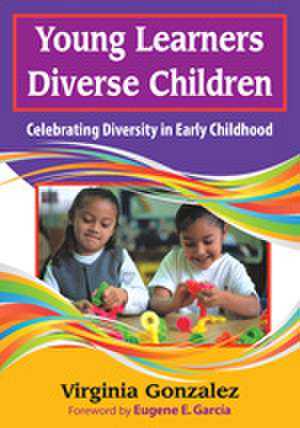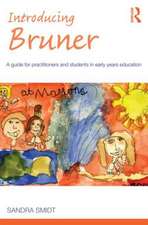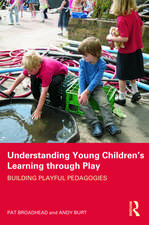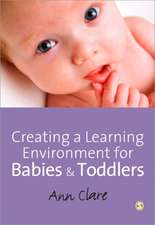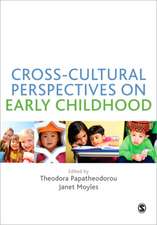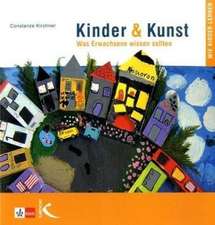Young Learners, Diverse Children: Celebrating Diversity in Early Childhood
Editat de Virginia M. Gonzalezen Limba Engleză Paperback – 7 dec 2009
Preț: 287.46 lei
Nou
Puncte Express: 431
Preț estimativ în valută:
55.01€ • 56.75$ • 45.90£
55.01€ • 56.75$ • 45.90£
Carte tipărită la comandă
Livrare economică 26 martie-09 aprilie
Preluare comenzi: 021 569.72.76
Specificații
ISBN-13: 9781412968140
ISBN-10: 1412968143
Pagini: 248
Dimensiuni: 178 x 254 x 18 mm
Greutate: 0.52 kg
Ediția:1
Editura: SAGE Publications
Colecția Corwin
Locul publicării:Thousand Oaks, United States
ISBN-10: 1412968143
Pagini: 248
Dimensiuni: 178 x 254 x 18 mm
Greutate: 0.52 kg
Ediția:1
Editura: SAGE Publications
Colecția Corwin
Locul publicării:Thousand Oaks, United States
Recenzii
"This book guides the reader in delivering developmentally appropriate instruction that supports the whole child and facilitates learning and academic achievement. The very detailed case study in Chapter 5 shows how assessment can be administered and how it links with instruction and documenting developmental growth."
"A resource on this up-and-coming issue hasn’t been available up to this point. It takes a detailed, research-based look at a diverse population of children across the country and can be used by classroom teachers, school divisions, and colleges.”
“This book provides many real-life examples and strategies that have worked for a practicing teacher, from implementing an appropriate curriculum to including the family in discussions about their child’s education. The charts at the end of the chapters really help the reader synthesize all of the information.”
"An extremely valuable resource for early child educators of young diverse children. Not only does the book include alternate forms of instruction for diverse young children, but it also provides alternative forms of assessment. The ethnic educator philosophy endorsed by the book is one that can be applied to any classroom setting. All early childhood teachers, whether they have been teaching for twenty years or are just beginning their career, should read this book."
"A resource on this up-and-coming issue hasn’t been available up to this point. It takes a detailed, research-based look at a diverse population of children across the country and can be used by classroom teachers, school divisions, and colleges.”
“This book provides many real-life examples and strategies that have worked for a practicing teacher, from implementing an appropriate curriculum to including the family in discussions about their child’s education. The charts at the end of the chapters really help the reader synthesize all of the information.”
"An extremely valuable resource for early child educators of young diverse children. Not only does the book include alternate forms of instruction for diverse young children, but it also provides alternative forms of assessment. The ethnic educator philosophy endorsed by the book is one that can be applied to any classroom setting. All early childhood teachers, whether they have been teaching for twenty years or are just beginning their career, should read this book."
Cuprins
Lists of Figures and Tables
Foreword by Eugene E. Garcia
Preface: A Letter to the Reader
Acknowledgments
About the Author
Part I. Ethnic-Educator Philosophical and Theoretical Framework
1. The Ethnic-Educator Philosophy
Examples of Principle 1
Examples of Principle 2
Examples of Principle 3
Examples of Principle 4
2. The Ethnic-Educator Pedagogical Model
How Teachers' Personalities Affect Their Assessment and Instructional Decisions
A Socioconstructivistic Pedagogical Model Supporting the Ethnic-Educator Approach
The Four Pedagogical Principles for Learning and Academic Achievement
Part II. Educational Applications of the Ethnic-Educator Approach
3. Teaching Strategies
Strategies Supporting the Ethnic-Educator Approach
First Cluster of Pedagogical Strategies: Thematic Curriculums
First Cluster of Pedagogical Strategies: Holistic Developmental Curriculums
Second Cluster of Pedagogical Strategies: Stimulating Critical-Thinking Skills
Second and Third Clusters of Pedagogical Strategies: A Pluralistic Pedagogy Stimulating Connections to Prior Sociocultural Knowledge and Real-life Experiences
Fourth Cluster of Pedagogical Strategies: An Advocacy Position for Teachers
Suggestions for Applying the Strategies
4. Linking the Teaching Strategies With Academic Content Standards
Linking Assessment to Instruction Through Classroom-Based Observations
Instructional Purposes of Assessment
Integration of Teaching Principles With TESOL Academic Content Standards in the Curriculum
Linking Assessment to Instruction Through Classroom-Based Observations
5. Developmental Tasks for Linking Assessment to Instruction
Case Study Introducing Individual Developmental Tasks
Discussion of Paula's Overall Performance Across Developmental Tasks
6. Storytelling
Research-Based Knowledge Supporting Storytelling as an Alternative Assessment
Storytelling as an Assessment Method of First- and Second-Language and Cognitive Development
Developmental Stages of Narrative and Semantic Development in Children
Socioconstructivist Perspective for Language Development
Sociocultural Perspective for Language Development
Application of Research-Based Knowledge to Actual Assessment Strategies
Recommended Strategies for Clustering Coding of Responses
Four Recommended Strategies for Interpreting Evaluation Results
Conclusions
7. Alternative Reading Instruction
Introduction
Theoretical Framework Supporting Reading Instruction in Young, Diverse Children
Guided-Reading Approach for Developing Reading-Comprehension Skills
Application of the Guided-Reading Approach
Application of the Schema Theory
Repetition and Practice Make Perfect
Activities for Increasing Reading Abilities
Family Involvement for Increasing Reading Skills
Bridging the Gap Between School and Home Cultures Through Parental Participation
Conclusions
8. Conclusions and Recommendations for Educating Diverse Young Children
Introduction: The BPDC as a Learning Context
Interviews With Teachers Participating in the BPDC Project
Interviews With Diverse and Mainstream Parents Participating in the BPDC Project
Overall Conclusions
Appendix A. Alignment of Philosophical and Pedagogical Principles and Pedagogical Strategies Endorsed by the Ethnic-Educator Approach for Young, Diverse Children
References
Index
Foreword by Eugene E. Garcia
Preface: A Letter to the Reader
Acknowledgments
About the Author
Part I. Ethnic-Educator Philosophical and Theoretical Framework
1. The Ethnic-Educator Philosophy
Examples of Principle 1
Examples of Principle 2
Examples of Principle 3
Examples of Principle 4
2. The Ethnic-Educator Pedagogical Model
How Teachers' Personalities Affect Their Assessment and Instructional Decisions
A Socioconstructivistic Pedagogical Model Supporting the Ethnic-Educator Approach
The Four Pedagogical Principles for Learning and Academic Achievement
Part II. Educational Applications of the Ethnic-Educator Approach
3. Teaching Strategies
Strategies Supporting the Ethnic-Educator Approach
First Cluster of Pedagogical Strategies: Thematic Curriculums
First Cluster of Pedagogical Strategies: Holistic Developmental Curriculums
Second Cluster of Pedagogical Strategies: Stimulating Critical-Thinking Skills
Second and Third Clusters of Pedagogical Strategies: A Pluralistic Pedagogy Stimulating Connections to Prior Sociocultural Knowledge and Real-life Experiences
Fourth Cluster of Pedagogical Strategies: An Advocacy Position for Teachers
Suggestions for Applying the Strategies
4. Linking the Teaching Strategies With Academic Content Standards
Linking Assessment to Instruction Through Classroom-Based Observations
Instructional Purposes of Assessment
Integration of Teaching Principles With TESOL Academic Content Standards in the Curriculum
Linking Assessment to Instruction Through Classroom-Based Observations
5. Developmental Tasks for Linking Assessment to Instruction
Case Study Introducing Individual Developmental Tasks
Discussion of Paula's Overall Performance Across Developmental Tasks
6. Storytelling
Research-Based Knowledge Supporting Storytelling as an Alternative Assessment
Storytelling as an Assessment Method of First- and Second-Language and Cognitive Development
Developmental Stages of Narrative and Semantic Development in Children
Socioconstructivist Perspective for Language Development
Sociocultural Perspective for Language Development
Application of Research-Based Knowledge to Actual Assessment Strategies
Recommended Strategies for Clustering Coding of Responses
Four Recommended Strategies for Interpreting Evaluation Results
Conclusions
7. Alternative Reading Instruction
Introduction
Theoretical Framework Supporting Reading Instruction in Young, Diverse Children
Guided-Reading Approach for Developing Reading-Comprehension Skills
Application of the Guided-Reading Approach
Application of the Schema Theory
Repetition and Practice Make Perfect
Activities for Increasing Reading Abilities
Family Involvement for Increasing Reading Skills
Bridging the Gap Between School and Home Cultures Through Parental Participation
Conclusions
8. Conclusions and Recommendations for Educating Diverse Young Children
Introduction: The BPDC as a Learning Context
Interviews With Teachers Participating in the BPDC Project
Interviews With Diverse and Mainstream Parents Participating in the BPDC Project
Overall Conclusions
Appendix A. Alignment of Philosophical and Pedagogical Principles and Pedagogical Strategies Endorsed by the Ethnic-Educator Approach for Young, Diverse Children
References
Index
Descriere
Nurture young children’s self-esteem and boost learning by integrating family culture with instruction!
Emphasizing how connecting instruction with children’s backgrounds increases learners’ confidence and fosters a supportive learning environment, this book helps teachers improve outcomes for diverse and low socioeconomic status (SES) students. Drawing on field-tested methods, the author merges cognition, language, and culture and presents lesson plans, classroom-based alternative assessment tools, and best practices to help readers:
- Improve literacy through storytelling that reflects students’ lives
- Collaborate with parents to increase student achievement
- Correlate curriculum with TESOL standards for young children
- Integrate academic standards across developmental levels
